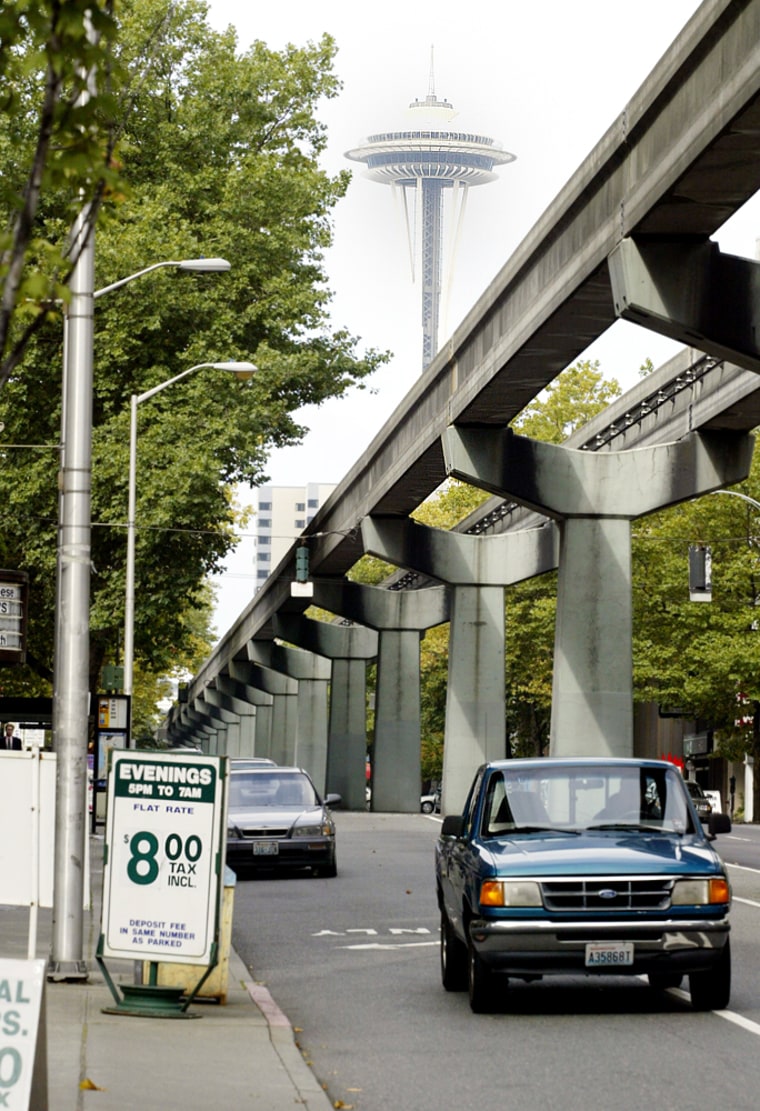When it first whooshed through the sky above crowds at the 1962 World’s Fair, the gleaming metallic car of Seattle’s monorail was lauded as the future of mass public transit.
More than 40 years later, the one-mile run is still the only train in town. And a series of management shake-ups and money problems have even some supporters wondering how an expanded monorail will get off the ground in this traffic-plagued city.
If the project does sputter, it would be an ignoble end for an idea that Seattle voters have supported four times in the past decade.
“There’s always been a lot of questions about this project and basically all of the questions have come home to roost,” said City Councilman Richard Conlin, a self-described monorail skeptic. “A lot of people are saying, ’Forget it altogether.”’
The monorail has long been part of environmentally conscious Seattle’s shared dream for a new transit system. Many point to the World’s Fair, which also gave Seattle its trademark Space Needle, as the source of public desire for a slick, futuristic electric train that would clear cars from the street below.
“Somehow, you’d be able to go wherever you want, whenever you want, and it would be cheap and easy and that sort of thing. It’s a vision,” Conlin said.
The city’s tree-fringed waterside vistas and looming snowcapped mountains also make an elevated train an attractive option, said Peter Sherwin, a monorail activist.
“Seattle is a fabulously beautiful place,” he said. “The ride on this monorail ... the awesome views that you would get at sunset or sunrise or any other time of day, for that matter, would be beautiful.”
The project’s cloudy future springs from a dire financial picture and a highly criticized borrowing plan that prompted the resignations of the city monorail board’s chairman and executive director days after fellow board members rejected it.
The plan was released late last month after negotiations with the Cascadia Monorail Co., a consortium of 29 companies that would design, build, operate and maintain the line. It would have paid more than $9 billion in interest on low-grade bonds, more than four times the project’s estimated cost.
Critics said discussions between the monorail board and Cascadia — the only bidder — were too secretive, and some are now calling for the project to face a new round of bids. Cascadia’s current offer lapses in mid-December.
If it can’t develop a satisfactory alternative, the board will need to cut costs or raise more money, which could require another citywide vote.
At a recent public meeting, board members heard some words of encouragement along with heavy criticism from opponents and city residents.
Jo Hill, who lives in the city’s Crown Hill neighborhood, chastised officials for failing to live within their budget or deliver the promised 14-mile Green Line. “The time has come to give us what we voted for at the advertised price, or stop the bleeding, pay what we owe and stop the current folly,” she said.
Kristina Hill, the board’s vice chairwoman, says she’s leery of voter fatigue over the project. And while the board considers all options “on the table,” it also believes it can find a solution that fits with its current construction proposal, Hill said.
“I think that just starting from scratch would be a mistake,” she said.
Sherwin, who has been co-chairman of the city’s past two monorail campaigns, said financial supporters and campaigners also are growing tired of trotting out the same message.
“There’s a certain tiredness to the campaigning, over and over,” he said. “I can’t take it anymore. It’s the same conversation, it’s six years of the same stuff.”
However, Ben Schiendelman, who also attended the public hearing, said Seattle residents still support the idea of a monorail because they’re desperate for something to ease their traffic woes. A study of 2003 traffic figures by the Texas Transportation Institute ranked Seattle tied with Detroit for the nation’s 12th worst congestion during peak driving times.
Given any number of trains, subways or buses to choose from, “I think most people would say ’I don’t care. Just get it done,”’ Schiendelman said.
